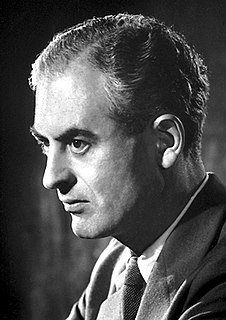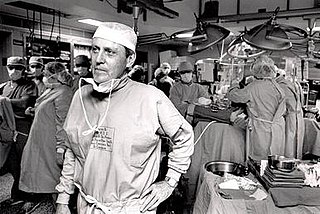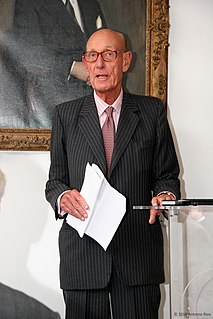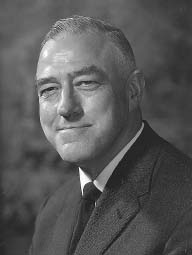
Sir Peter Brian Medawar was a British biologist and writer, whose works on graft rejection and the discovery of acquired immune tolerance were fundamental to the medical practice of tissue and organ transplants. For his scientific works he is regarded as the "father of transplantation". He is remembered for his wit both in person and in popular writings. Famous zoologists such as Richard Dawkins referred to him as "the wittiest of all scientific writers", and Stephen Jay Gould as "the cleverest man I have ever known".

Sir Magdi Habib Yacoub, is an Egyptian-British retired professor of cardiothoracic surgery at Imperial College London, best known for his early work in repairing heart valves with surgeon Donald Ross, adapting the Ross procedure, where the diseased aortic valve is replaced with the person's own pulmonary valve, devising the arterial switch operation (ASO) in transposition of the great arteries, and establishing the heart transplantation centre at Harefield Hospital in 1980 with a heart transplant for Derrick Morris, who at the time of his death was Europe's longest-surviving heart transplant recipient. Yacoub subsequently performed the UK's first combined heart and lung transplant in 1983.

Edward Donnall "Don" Thomas was an American physician, professor emeritus at the University of Washington, and director emeritus of the clinical research division at the Fred Hutchinson Cancer Research Center. In 1990 he shared the Nobel Prize in Physiology or Medicine with Joseph E. Murray for the development of cell and organ transplantation. Thomas and his wife and research partner Dottie Thomas developed bone marrow transplantation as a treatment for leukemia.
Jacques Francis Albert Pierre Miller AC FRS FAA is a French-Australian research scientist. He is known for having discovered the function of the thymus and for the identification, in mammalian species of the two major subsets of lymphocytes and their function.

Thomas Earl Starzl was an American physician, researcher, and expert on organ transplants. He performed the first human liver transplants, and has often been referred to as "the father of modern transplantation." A documentary, entitled "Burden of Genius," covering the medical and scientific advances spearheaded by Starzl himself, was released to the public in 2017 in a series of screenings.

Roger Stanley Williams CBE FRCS FRCP FRCPE FRACP FMedSci was a British professor of hepatology. He was Director of the Institute of Hepatology, London and Professor of Hepatology, King's College London. He was also Medical Director of the charity, the Foundation for Liver Research a UK registered charity and was the lead person of the Lancet Commission into Liver Disease in the UK.

Sir Roy Yorke Calne, FRCP, FRCS, FRS is an English surgeon and pioneer in organ transplantation.

Sir Michael Francis Addison Woodruff, FRS, FRSE FRCS was an English surgeon and scientist principally remembered for his research into organ transplantation. Though born in London, Woodruff spent his youth in Australia, where he earned degrees in electrical engineering and medicine. Having completed his studies shortly after the outbreak of World War II, he joined the Australian Army Medical Corps, but was soon captured by Japanese forces and imprisoned in the Changi Prison Camp. While there, he devised an ingenious method of extracting nutrients from agricultural wastes to prevent malnutrition among his fellow POWs.
Rupert Everett Billingham FRS was a British biologist who did significant research in the fields of reproductive immunology and organ transplantation. "He made numerous fundamental contributions to our modern knowledge of the mechanisms of graft rejection and how to prevent it, and he analysed some of the mechanisms responsible for the survival of the mammalian foetus in an immunologically hostile environment".

Sir James Learmonth Gowans was a British physician and immunologist. In 1945 while studying medicine at King's College Hospital, he assisted at the liberated Bergen-Belsen concentration camp as a voluntary medical student.
Sir Peter John Morris, AC, FRS, FMedSci, FRCP, FRCS is an emeritus Nuffield professor of surgery at the University of Oxford, former President of the Royal College of Surgeons of England, founder of the Oxford Transplant Centre and director of the Centre for Evidence in Transplantation at the Royal College of Surgeons of England.
Norman Edward Shumway was a pioneer of heart surgery at Stanford University. He was the 67th president of the American Association for Thoracic Surgery and the first to perform an adult human to human heart transplantation in the United States.

Andrew K. Burroughs was a British physician, researcher and teacher. He is renowned for his wide contribution to the field of Hepatology; he has been termed one of the greatest hepatologists of our times and the true representative of Dame Sheila Sherlock's legacy.

Sir Terence Alexander Hawthorne English is a South African-born British retired cardiac surgeon. He was Consultant Cardiothoracic Surgeon, Papworth Hospital and Addenbrooke's Hospital, Cambridge, 1973–1995. After starting a career in mining engineering, English switched to medicine and went on to lead the team that performed Britain's first successful heart transplant in August 1979 at Papworth, and soon established it as one of Europe's leading heart–lung transplant programmes.

Ray David Owen was a teacher and scientist whose discovery of unusual, “mixed,” red blood cell types in cattle twins in 1945 launched the fields of modern immunology and organ transplantation. Owen's 1945 findings were published in the journal Science. This observation demonstrated that self was “learned” by the immune system during development and paved the way for research involving induction of immune tolerance and early tissue grafting. When Frank Macfarlane Burnet and Sir Peter Brian Medawar were awarded their 1960 Nobel Prize in Physiology or Medicine for the discovery of acquired immunological tolerance, Owen was not mentioned in the prize. However, in a letter to Owen, Medawar stated that he believed Owen should have also been included in the prize. Owen also led the successful effort to admit women as California Institute of Technology undergraduates.
Prof Thomas Gibson FRSE (1915-1993) was an eminent Scottish plastic surgeon serving as Professor of Plastic Surgery and Bioengineering at Strathclyde University. Together with Robert Kenedi he cofounding the Bioengineering Department in 1961. His research forms the basis for modern tissue transplantation techniques. In 1960 Sir Peter Medawar wrote to Gibson giving "deep obligation" to him for paving the way for his understanding which led to Medawar being awarded the Nobel prize for Medicine in 1960. His letter ended "thank God I was lucky enough to team up with you".
Surapol Issaragrisil is medical doctor and professor of medicine at Division of Hematology, Department of Medicine, Faculty of Medicine Siriraj Hospital, Mahidol University. He is an expert at hematology, bone marrow transplantation, and blood stem cells transplantation.
Pankaj Chandak is an Indian-born British surgeon who made innovations in the use of 3D printing in paediatric kidney transplant surgery. He has also undertaken work in education, public engagement, presenting demonstrations, and acting in The Crown television series. He graduated from Guy's and St Thomas' University of London medical school and was an anatomy demonstrator under Professor Harold Ellis CBE.

The British Transplantation Society (BTS) is a non-profit professional body representing the community of physicians, surgeons, nurses, allied health professionals and scientists involved in organ transplantation in the United Kingdom. The BTS supports the provision and dissemination of medical research in organ transplantation, and also develops national guidance and policy in the provision of transplant care to patients, including living donation. Notably the society supported the debate for presumed consent from deceased donors in United Kingdom parliament and also the use of donation after circulatory failure (DCD) in the expansion of the donor pool.












